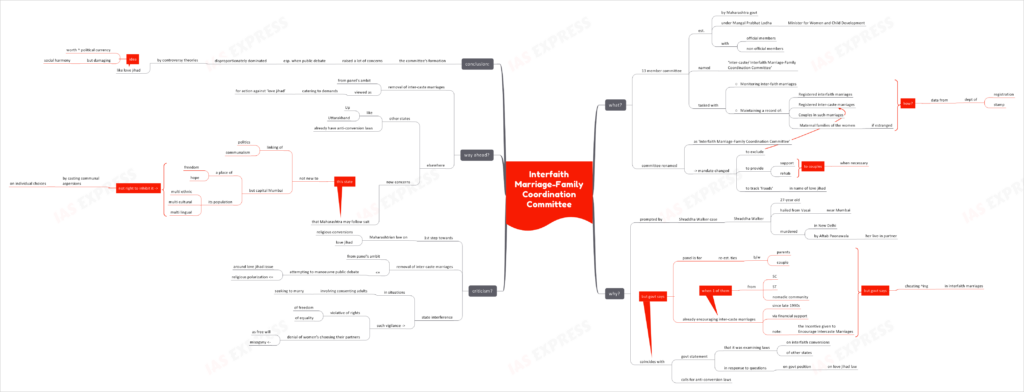Interfaith Marriage-Family Coordination Committee- Reasons for Criticism

The recent move by Maharashtra government regarding the interfaith marriage panel has raised concerns about the state’s interference in the rights to privacy and personal choice.

This topic of “Interfaith Marriage-Family Coordination Committee- Reasons for Criticism” is important from the perspective of the UPSC IAS Examination, which falls under General Studies Portion.
What is the Interfaith Marriage-Family Coordination Committee?
- On December 13th, the Maharashtra government set up a 13-member committee under Mangal Prabhat Lodha, the state’s Minister for Women and Child Development.
- The committee, titled ‘Inter-caste/ Interfaith Marriage-Family Coordination Committee’, was tasked with:
- Monitoring inter-faith marriages
- Maintaining a record of:
- Registered interfaith marriages
- Registered inter-caste marriages
- Couples in such marriages
- Maternal families of the women (if they are estranged)
- The committee, composed of official and non-official members, will depend on data from the state’s department of registration and stamp.
- Following media reports and criticisms, the state government renamed the committee as ‘Interfaith Marriage-Family Coordination Committee’ and correspondingly, its mandate was limited to interfaith marriages alone.
- The committee is supposed to:
- Provide support and rehabilitation to inter-faith couples when necessary
- Track ‘frauds’ committed in the name of ‘love jihad’
Why was this committee formed?
- The state government claimed that the decision was prompted by the Shraddha Walker case:
- The 27-year old Shraddha Walker, who hailed from Vasai (near Mumbai), was murdered in New Delhi.
- The murder was allegedly committed by Aftab Poonawala, her live-in partner.
- The decision also coincides with the government’s statement that it was examining the other states’ laws on interfaith conversions. The statement was made in response to a question about the government’s position on a ‘love jihad’ law.
- While there have been calls for a state law against religious conversions, the committee head held that it seeks to re-establish the ties between interfaith couples and their estranged families.
- The government also pointed out its efforts in encouraging inter-caste marriages (such as the Incentive given to Encourage Intercaste Marriages) and its plans to financially reward inter-faith couples. On the other hand, it also said that the number of cheating cases in interfaith marriages has increased.
Why is it being criticized?
- There are concerns that the panel’s formation is the 1st step towards a Maharashtrian law on religious conversions/ love jihad (i.e. the conspiracy theory that Hindu women are being trapped by men of other faiths, through marriage, for religious conversion).
- The move to remove inter-caste marriages from the panel’s purview is being implied as the government attempting to manoeuvre the public debate around the controversial ‘love jihad’ issue.
- There is a concern that such manoeuvring could lead to religious polarization.
- Critics are questioning the state’s interference in situations where 2 consenting adults seek to marry. Such vigilance is being criticized as indicative of the State’s unacceptable interference in the lives of individual citizens. It is violating the individuals’ rights of freedom and equality.
- This denial of women choosing their partner as acts of free will is also indicative of the misogyny prevalent in the larger society.
What is the way ahead?
- The removal of inter-caste marriages from the panel’s ambit is being viewed as catering to the demands for action against ‘love jihad’. Incidentally, the Maharashtra government has been providing financial aid to inter-caste couples since late 1990s. To avail this benefit, at least one of the two should be from SC, ST or nomadic tribe community.
- Elsewhere, other states like UP and Uttarakhand have already enacted anti-conversion legislations. There is a concern that Maharashtra may follow suit.
- While the link between politics and communalism isn’t a new phenomenon in the state, its capital Mumbai has, for the most part, remained a place of freedom and hope- with its multi-ethnic, multi-cultural and multi-lingual population.
- It isn’t right to inhibit the idea of openness and possibility offered by such a ‘maya nagari’, especially by casting communal aspersions on individual choices.
Conclusion:
The Interfaith Marriage-Family Coordination Committee has raised a lot of concerns in a time where public debate is being disproportionately dominated by controversy theories like love jihad. While the idea is worth a lot of political currency, it is likely to be harmful for social harmony.
Practice Question for Mains:
Why is the Interfaith Marriage-Family Coordination Committee formed by the Maharashtra government facing criticism? (250 words)

